March 06 2006 4:46 PM EST
CONTACTAbout UsCAREER OPPORTUNITIESADVERTISE WITH USPRIVACY POLICYPRIVACY PREFERENCESTERMS OF USELEGAL NOTICE
© 2025 Equal Entertainment LLC.
All Rights reserved
All Rights reserved
By continuing to use our site, you agree to our Privacy Policy and Terms of Use.
We need your help
Your support makes The Advocate's original LGBTQ+ reporting possible. Become a member today to help us continue this work.
Your support makes The Advocate's original LGBTQ+ reporting possible. Become a member today to help us continue this work.
We chatted about it, joked about it, argued about it, spoofed it. Brokeback Mountain was everywhere in our popular culture--yet it lost the big Oscar it was supposed to win. Was there a "Brokeback Backlash," or was Crash just the worthy contender that came on strong in the final Best Picture stretch?
There were as many theories being offered up Monday as there are Brokeback parodies on the Internet. One theory was that, despite the hoopla, the endless late-night monologues, and the clever imitations, people (Academy voters, that is) didn't really love the soulful saga of two gay cowboys--and perhaps even felt uncomfortable with its themes.
"Sometimes people pretend to like movies more than they actually do," said Richard Walter, who heads the screenwriting program at UCLA's film school. "But this film wasn't really that good. What it tried to do was great, sensational. But what it actually accomplished wasn't so great. You can't really buy the love story."
Film critic Kenneth Turan, writing in the Los Angeles Times, said the problem wasn't with the film's quality. Rather, he said, "you could not take the pulse of the industry without realizing that this film made people distinctly uncomfortable.... In the privacy of the voting booth...people are free to act out the unspoken fears and unconscious prejudices that they would never breathe to another soul, or likely, acknowledge to themselves. And at least this year, that acting out doomed Brokeback Mountain."
Gay activists did not necessarily agree. "I don't think it has anything to do with the subject matter," said Joe Solmonese, president of the Human Rights Campaign, a national gay rights group. He noted that Brokeback and Crash both dealt with "tough issues like indifference and intolerance." "I was certainly disappointed," Solmonese said. "But I would trade that Oscar for all the positive conversations that this movie spurred between parents and their gay children or between employees and their gay coworkers. That impact transcends any accolades."
Some people focused on the demographics of the typical Academy voter: older and city-dwelling. Author and Brokeback co-screenwriter Larry McMurtry thought that was key to his film's loss. "Members of the Academy are mostly urban people," McMurtry, who won the adapted screenplay prize with Diana Ossana, said backstage at Sunday night's ceremony. "We are an urban nation. We are not a rural nation. It's not easy even to get a rural story made."
McMurtry could have added that not only are Academy voters urban, they also are from Los Angeles--the city that is the heart of Crash, a racial drama depicting the intertwining experiences of an array of characters over 36 hours. The film, featuring a huge and accomplished cast ("Raise your hand if you're not in Crash," host Jon Stewart quipped to the crowd), also won for original screenplay and film editing.
Brokeback director Ang Lee, who won the directing prize, said he hadn't a clue why the film didn't take the best-picture award. "They didn't vote for it," he said. "I don't know. You asked me one question, and I don't know the answer." But his brother had an opinion. Lee Kang, speaking in Tapei, Taiwan, suggested American bias was involved. "When the locals are voting, they will have this, whether you call it nationalism or something else," he said.
Crash writer-director Paul Haggis, for his part, said he hadn't "for a second" believed the whispers, which grew louder as Oscar night approached, that Crash had the momentum to overtake Brokeback. "I didn't believe any of that nonsense," he said. "In fact, we were so shocked. I mean, we're still trying to figure out if we got this."
Crash came out to mixed reviews in May, considered much too early for a film to stay in voters' minds. But Lionsgate Films reminded voters and critics of the movie's potency by flooding them with copies of the DVD late in 2005. In winning over the heavily favored Brokeback, the film evoked major upsets of the past, most recently the 1999 triumph of Shakespeare in Love over Saving Private Ryan. Another famous underdog champ was Chariots of Fire, which in 1982 beat both Warren Beatty's historical epic Reds and the family story On Golden Pond.
One disturbing difference for the Academy: A lot more viewers tuned in to see those upsets. An estimated 38.8 million people watched Sunday's telecast on ABC--down 8% from last year and the second-worst showing in nearly two decades, according to Nielsen Media Research. Except for the 2003 count of 33 million viewers--when Chicago took the best-picture award--viewership hadn't dipped below 40 million since 1987.
So what is to be learned from Sunday night's upset result? Not much, says Walter, the film professor. You just really never know what Academy voters are going to do. "It's just a crap shoot," Walter said. "You go to Vegas and you put your money on number 17. There is no lesson to be learned from all this. It doesn't mean a thing." (Jocelyn Noveck, AP)
From our Sponsors
Most Popular
Bizarre Epstein files reference to Trump, Putin, and oral sex with ‘Bubba’ draws scrutiny in Congress
November 14 2025 4:08 PM
True
Jeffrey Epstein’s brother says the ‘Bubba’ mentioned in Trump oral sex email is not Bill Clinton
November 16 2025 9:15 AM
True
Watch Now: Pride Today
Latest Stories
Trump's FDA sends warning letters to companies selling chest binders
December 19 2025 2:31 PM
Bowen Yang to leave SNL after Ariana Grande and Cher episode
December 19 2025 2:10 PM
Notorious anti-LGBTQ+ New York Archbishop Dolan retires — here are his worst moments
December 19 2025 1:27 PM
Sarah McBride knew some Democrats would betray trans people, so she lobbied Republicans
December 19 2025 12:55 PM
Creating Change Returns to Washington D.C. for 38th Convening for LGBTQ Advocacy
December 19 2025 12:22 PM
House passes bill banning Medicaid from covering gender-affirming care for youth
December 19 2025 11:05 AM
Health policy expert to RFK Jr.: You can't ban trans youth care this way
December 18 2025 5:37 PM
12 lesbian thrillers and mysteries to binge & where to watch them
December 18 2025 4:36 PM
Netflix's 'Boots' season 2 plot revealed by producer amid cancelation
December 18 2025 4:33 PM
Charlie Kirk's accused killer, Tyler Robinson, on LGBTQ+ issues: It's complicated
December 18 2025 4:04 PM
Sacramento man still in coma six weeks after suspected anti-LGBTQ+ hate crime
December 18 2025 1:17 PM
RFK Jr. and Dr. Oz announce sweeping measures to ban gender-affirming care for trans youth
December 18 2025 12:19 PM
True
Texas city will remove rainbow crosswalks under orders from Trump administration
December 18 2025 11:07 AM
Six key takeaways from Trump's speech to the nation, including 'transgender for everybody'
December 17 2025 10:51 PM
Marjorie Taylor Greene’s bill criminalizing gender-affirming care for minors passes with Democrats’ support
December 17 2025 6:47 PM
True
I didn’t just run the world’s major marathons. I changed them
December 17 2025 4:31 PM
Pam Bondi wants FBI to offer bounties for ‘radical gender ideology’ groups, leaked memo shows
December 17 2025 3:17 PM
Trending stories
Recommended Stories for You





































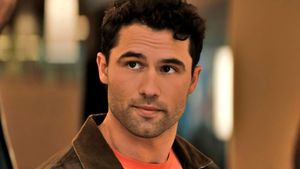








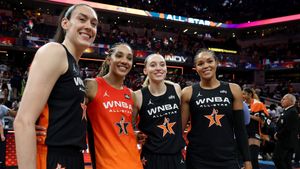







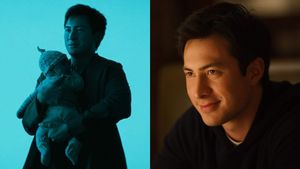




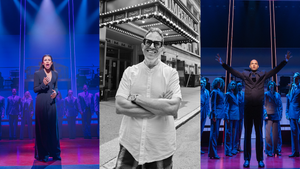



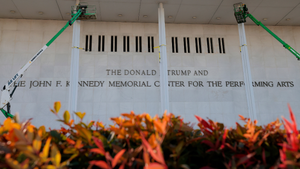




Charlie Kirk DID say stoning gay people was the 'perfect law' — and these other heinous quotes